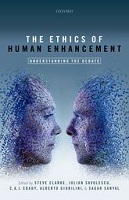The Ethics of Human Enhancement
Understanding the Debate

Contributor(s)
Clarke, Steve (editor)
Savulescu, Julian (editor)
Coady, C.A.J. (Tony) (editor)
Giubilini, Alberto (editor)
Sanyal, Sagar (editor)
Language
EnglishAbstract
We humans can enhance some of our mental and physical abilities above the normal upper limits for our species with the use of particular drug therapies and medical procedures. We will be able to enhance many more of our abilities and be able to do so in more ways in the not-too-distant future. Some commentators have welcomed the prospect of human enhancement technologies becoming widely used, while others have viewed it with alarm and have made clear that they find human enhancement morally objectionable. Unfortunately the debate over the ethics of human enhancement appears to have reached an impasse, with proponents and opponents of human enhancement drawing on different intellectual traditions, relying on different methodologies and ‘talking past one another’. In order to move this debate forward, we need either to find new ways of understanding the current debate or to develop new ways of thinking about the ethics of human enhancement. In this volume leading philosophers and bioethicists invite us to adopt new ways to think about the ongoing debate, either by drawing on work in psychology that helps to explain common reactions to the prospect of human enhancement or by finding points of comparison between the current debate about the ethics of human enhancement and other academic debates, such as the debate about justice for people with disabilities. Other contributors offer original lines of argument about the ethics of human enhancement and seek to take that debate in new directions.
Keywords
drug therapies, intellectual traditions, bioethicists, philosophers, human enhancement, people with disabilitiesDOI
10.1093/acprof:oso/9780198754855.001.0001ISBN
9780198754855Publisher
Oxford University PressPublisher website
https://global.oup.com/Publication date and place
Oxford, 2016Classification
Biochemistry
